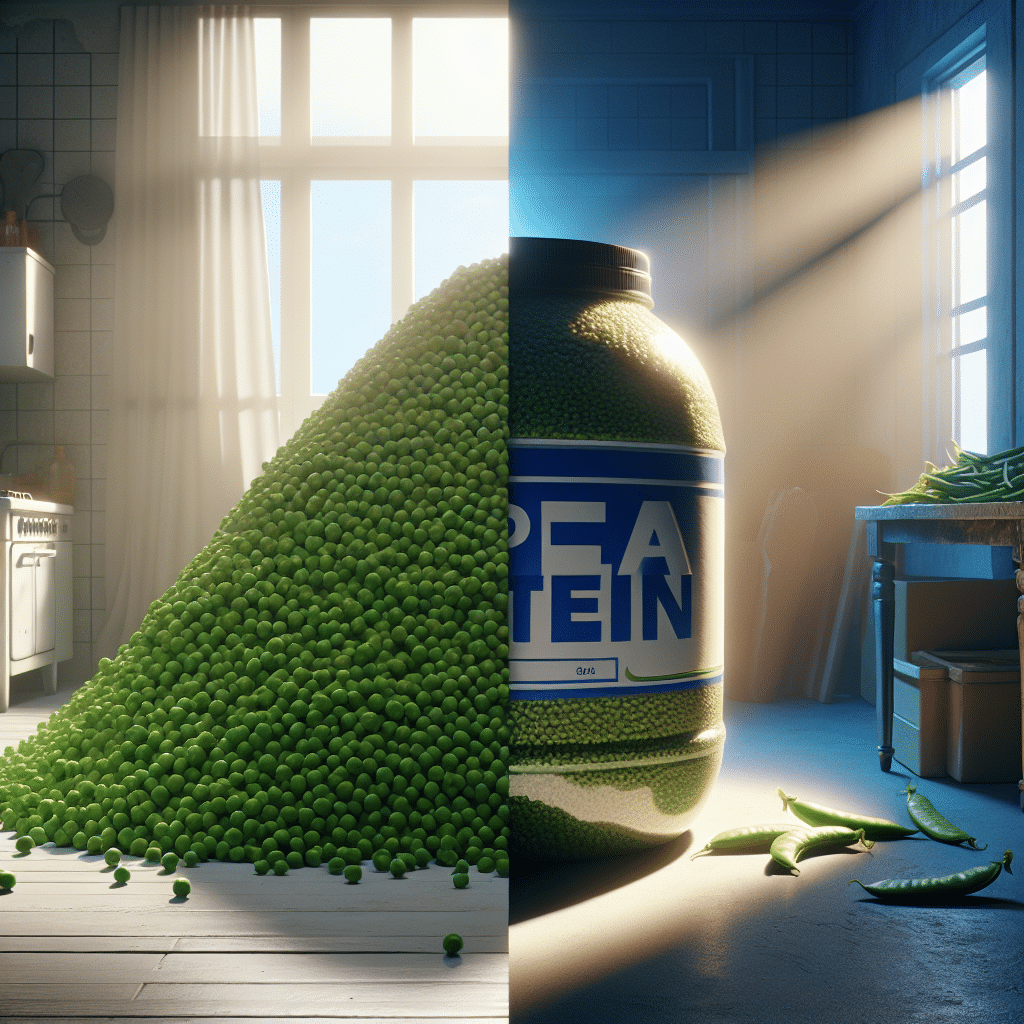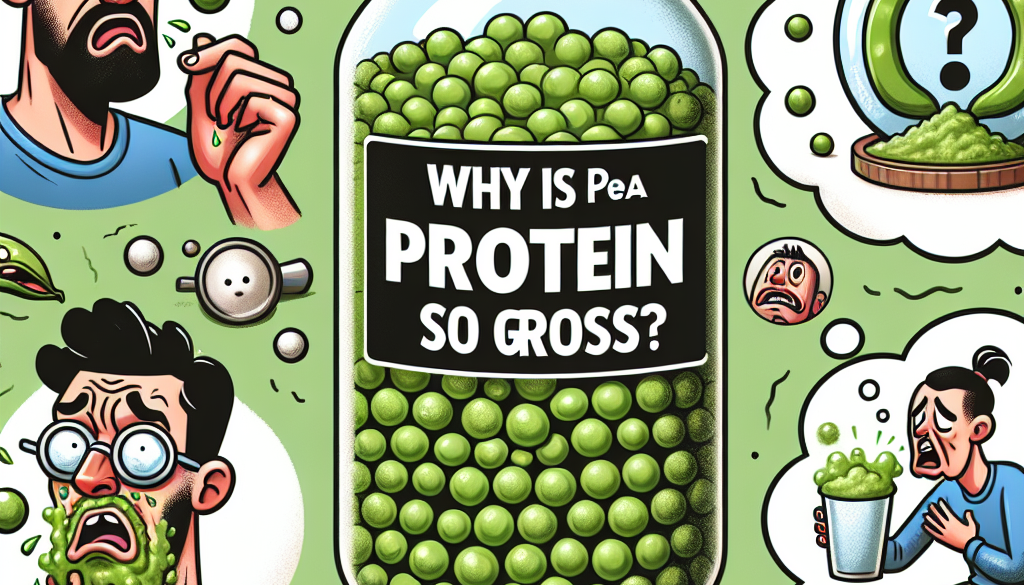Why Is Pea Protein So Gross? The answer
Table of Contents
- Pea Protein: Unraveling the Mystery Behind Its Unpleasant Taste
- Understanding Pea Protein
- The Flavor Profile of Pea Protein
- Texture Troubles
- Processing and Purification
- Nutritional Benefits vs. Sensory Appeal
- Improving the Taste of Pea Protein
- Consumer Adaptation and Expectation
- Case Studies and Innovations
- Conclusion: The Future of Pea Protein
- Discover ETprotein’s Superior Pea Protein Products
Pea Protein: Unraveling the Mystery Behind Its Unpleasant Taste

Pea protein has emerged as a popular plant-based alternative to animal-derived proteins, especially among vegans, vegetarians, and those with dietary restrictions. Despite its nutritional benefits, many consumers find pea protein less palatable, often describing it as “gross.” This article delves into the reasons behind the aversion to pea protein’s taste and texture, and explores how it can be improved.
Understanding Pea Protein
Pea protein is derived from yellow split peas and is a high-quality protein that contains all nine essential amino acids. It is often used in protein powders, meat substitutes, and dairy-free products. However, its taste and texture have been a point of contention for many consumers.
The Flavor Profile of Pea Protein
One of the primary reasons pea protein is considered unappetizing is its distinct flavor profile. Pea protein can have a strong, earthy taste that is often described as “beany” or “grassy.” This flavor can be off-putting to those who are accustomed to the more neutral taste of whey or soy proteins.
Texture Troubles
Aside from its taste, the texture of pea protein can also contribute to its negative reputation. Pea protein powders can sometimes be gritty or chalky, which can make them less enjoyable to consume, especially when mixed with water or other liquids.
Processing and Purification
The method of processing pea protein can significantly affect its taste and texture. Cheaper or less refined pea protein powders are more likely to have a stronger taste and a less desirable texture. Advanced filtration and purification processes can help reduce these negative attributes, but they may also increase the cost of the product.
Nutritional Benefits vs. Sensory Appeal
Despite its taste and texture, pea protein is favored for its nutritional profile. It is rich in iron and arginine and is often considered a more sustainable and hypoallergenic alternative to other protein sources. However, the challenge remains to balance these health benefits with sensory appeal.
Improving the Taste of Pea Protein
Manufacturers are continuously working on ways to improve the taste of pea protein. This includes experimenting with fermentation, adding flavor enhancers, and blending it with other plant-based proteins to mask its strong taste.
Consumer Adaptation and Expectation
As plant-based diets become more mainstream, consumers are gradually adapting to the unique flavors of plant proteins, including pea protein. Additionally, setting the right expectations about the taste and texture of pea protein can help new users approach it with an open mind.
Case Studies and Innovations
Several brands have successfully incorporated pea protein into their products without compromising on taste. Through innovative formulations and flavor masking techniques, these companies have set a benchmark for making pea protein more palatable.
Conclusion: The Future of Pea Protein
While pea protein may not be everyone’s favorite due to its taste and texture, ongoing research and development are likely to improve its sensory qualities. The key takeaways include understanding the reasons behind its “gross” reputation, recognizing its nutritional value, and acknowledging the efforts to enhance its palatability.
Discover ETprotein’s Superior Pea Protein Products
If you’re looking for high-quality pea protein that doesn’t compromise on taste, ETprotein offers a range of products that might change your mind about this plant-based powerhouse. Their clear pea protein is designed to be neutral in taste, making it an excellent choice for those who are sensitive to the typical flavor of pea protein.
About ETprotein:
ETprotein, a reputable protein and L-(+)-Ergothioneine (EGT) Chinese factory manufacturer and supplier, is renowned for producing, stocking, exporting, and delivering the highest quality organic bulk vegan proteins and L-(+)-Ergothioneine. They include Organic rice protein, clear rice protein, pea protein, clear pea protein, watermelon seed protein, pumpkin seed protein, sunflower seed protein, mung bean protein, peanut protein, and L-(+)-Ergothioneine EGT Pharmaceutical grade, L-(+)-Ergothioneine EGT food grade, L-(+)-Ergothioneine EGT cosmetic grade, L-(+)-Ergothioneine EGT reference grade and L-(+)-Ergothioneine EGT standard. Their offerings, characterized by a neutral taste, non-GMO, allergen-free attributes, with L-(+)-Ergothioneine purity over 98%, 99%, cater to a diverse range of industries. They serve nutraceutical, pharmaceutical, cosmeceutical, veterinary, as well as food and beverage finished product distributors, traders, and manufacturers across Europe, USA, Canada, Australia, Thailand, Japan, Korea, Brazil, and Chile, among others.
ETprotein specialization includes exporting and delivering tailor-made protein powder and finished nutritional supplements. Their extensive product range covers sectors like Food and Beverage, Sports Nutrition, Weight Management, Dietary Supplements, Health and Wellness Products, and Infant Formula, ensuring comprehensive solutions to meet all your protein needs.
As a trusted company by leading global food and beverage brands and Fortune 500 companies, ETprotein reinforces China’s reputation in the global arena. For more information or to sample their products, please contact them and email sales(at)ETprotein.com today.












